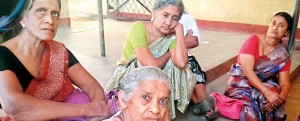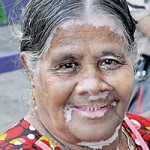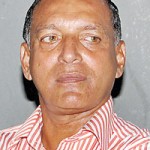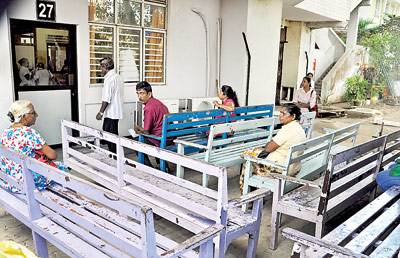News
Patients patience wears thin with doctors’ strike
View(s):B.J. Japin, a 70-year-old from Wattala, arrived at the Colombo National Hospital on Thursday to seek treatment. Her blood pressure was high and she had been feeling unwell.

Dambulla Hospital: Worn out patients seated on steps awaiting doctors. Pic by Kanchana Kumara Ariyadasa
She was not aware that the doctors were on strike and waited for more than an hour for a doctor before being told of the strike.
“The doctors are holding us hostage to gain their demands,” Ms Japin said angrily.
“Doctors are able to buy vehicles from the money they earn from private practice yet they cling to car permits while we on the other hand, who have to take public transport and wait in long lines to get free treatment, are left to die.”
She had been told to come back to the hospital next week because of the strike.
Abdul Majeed Amma, another patient from the outskirts of Colombo, said she had waited for several hours at the clinic where she normally gets her pressure checked but no doctor had come to see her.
Eventually a nurse had told her the doctors were on strike.
She was angry that she had to manage with medicine enough for only one week and has to go back to get more.
“It is outrageous,” she said. “I have just enough money for travelling. I cannot spend thousands at pharmacies. That’s why I visit the OPD to get free medicine.”
Marathon Rodrigo, a businessman who visited the hospital to get his knee checked, said that he had fruitlessly waited three hours to see a doctor.

B.J. Japin:“The doctors are holding us hostage to gain their demands”
Stories such as these were legion during an islandwide work stoppage by the Government Medical Officers Association (GMOA) on Thursday, a strike that also drew in 18 other governmental institutions.
The doctors’ strike affected most of the patients at the clinics, out-patient departments and surgery units. The doctors demanded the re-establishment of pensions for government servants and vehicle permits for doctors every five years on the basis that they need transport to travel to rural hospitals.
They also wanted an end to bringing Indian diploma holders and technicians to work in the country under the CEPA agreement.
The injured, sick and weakend patients who were arriving at the Colombo National Hospital OPD were turned back by hospital staff saying the doctors were on strike.
The medicine-issuing counters of the OPD were closed and the lights switched off, leaving patients in the dark. People who had travelled in from rural areas were sleeping on the benches, unattended.
Patients attending outstation hospitals were also affected.
Nuwara Eliya Hospital director Dr. Aruna Jayasekara said hospital clinic and surgery services were absent but the OPD services had been in operation.

Marathon Rodrigo: Waited for 3 hours to see a doctor
He said 28 specialist doctors went on strike, while 84 other doctors took union action, Intern doctors provided emergency services.
Jaffna Hospital Director Dr. T. Sathiyamoorthi said doctors at the clinic and OPD went on strike but that normal services and emergency surgery continued.
He said the GMOA should have informed patients earlier that they were going on strike because two-thirds of the patients who came to the hospital had been sent home.
Kandy Hospital deputy director Dr. Nishantha Wijewardene said urgent surgeries and emergency services were performed while the OPD and clinic sections were closed.
Most clinic patients were sent to private pharmacies for their medication and told to return to hospital in a week.
GMOA officers stated that discussions with President Maithripala Sirisena had been fruitful as the President as well as Health Minister Rajitha Senaratne had understood their concerns.
GMOA Secretary Dr. Nalinda Herath said Mr. Sirisena wanted to hold a special meeting next week with Prime Minister Ranil Wickramasinghe, the finance and health ministers and union representatives.
He said doctors ended their “token strike” on Friday morning and would take their case to the public. They would take any further trade union action decided by their executive committee if the union’s demands were not met.

National Hospital: Empty benches in the OPD section. Pix by Ranjith Perera
Trade unions of 19 executive services supported the medical officers on strike with union action in their relevant departments. Most unions showed support by members taking sick leave.
The Sri Lanka Executive Services Association (SLESA) adopted a work-to-rule policy.
The Joint Committee of Executive Officers in All-Island Services, Sri Lanka Policy Planning Services Association, GOMA and SLESA were some of the unions taking part in strike action. Engineers, educationists, administrative staff and accountants were just some of those represented.
All work in government institutions came to a standstill as a result of the action.
Closing of annual accounts were delayed by a day because state accountants did not turn up to work. District Secretariat offices around the country were also affected.
Among the affected departments was the Department of Persons Registration (DPR), the work-to-rule campaign delaying the process of issuing identity cards and making schoolchildren sitting for the GCE Ordinary Level examinations wait long hours at to obtain their ID cards.
A student of Maliyagamuwa Mahavidyalaya at Avissawella, Sanduni Iwanka Katugampola, said that she had been waiting from 7am and had been told to wait until the afternoon.
She claimed officials deliberately delayed correcting her name on the identity card after it had been misstated.Sanduni’s mother, Mrs. Chandrawathi Menike, said that they had travelled a long way.
Another student, K.B.N. Shirantha Viraj from Kahathuluwa Maha Vidyalaya, said he had set off for the DPR at 3 a.m. to get his ID card by 7am and go on to school but had not so far obtained his card.
Most of the children had worn their uniforms thinking that they would be able to obtain identity cards and afterwards attend school.
Eight students of a school at Kilinochchi who had been brought to the DPR by their school principal and her husband, said officials had been slow in issuing the needed documents.
The children had been travelling from 10 p.m. the previous day and had not been able to get their cards until 11.45am, the principal’s husband, Mr. Daham Bulathsinghala said.

